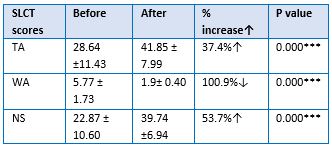Effect of Trataka (A Yogic Cleansing Technique) on Post-Covid Cognitive Impairments in Elders
DOI:
https://doi.org/10.21760/jaims.7.7.8Keywords:
Cognitive function, Trāṭaka, COVID-19, SLCT, DLST.Abstract
Background: People who have survived COVID-19 frequently complain of cognitive dysfunction, which has been described as brain fog. Early reports describing a dysexecutive syndrome after COVID-19 and has considerable implications for occupational, psychological, and functional outcomes. It is well known that elders may be particularly susceptible to cognitive impairment after critical illness. Trāṭaka (a yogīc cleansing technique) is one of the Yogā practices which is considered to improve cognitive functions. The objective of this study was to determine whether Trāṭaka practice enhances the cognitive functions of the post covid elderly subjects. Material and Methods: Thirty elders who had enrolled in a thirty days Trāṭaka practice program. Their age ranged between 60 and 80 years (group average ±S.D., 68.5±6.3 years). Those who have any chronic illness and mental illness, and those who are not willing to participate were excluded. Trāṭaka intervention is given for 30 days, 1hour/day. At baseline and following thirty days, all participants completed DLST and SLCT. Results: Trāṭaka intervention showed significant change in DLST scores, increase (P-value< 0.000) in total attempted score, significant increase (P-value<0.000) in net score, significant reduction in wrongly attempted score (P-value<0.000). Significant change in SLCT scores, significant increase (P-value<0.000) in total attempted score, Similarly, significant increase (P-value<.000) in net score, significant reduction in wrongly attempted score (P-value<0.000). Conclusion: The thirty days Trāṭaka intervention was successful in enhancing the cognitive functions among post-covid elders.
Downloads
References
Helms J, Kremer S, Merdji H, et al. Neurologic features in severe SARS-CoV-2 infection. N Engl J Med. 2020;382(23):2268-2270. doi:10.1056/NEJMc2008597
Pandharipande PP, Girard TD, Jackson JC, et al; BRAIN-ICU Study Investigators. Long-term cognitive impairment after critical illness. N Engl J Med. 2013;369(14):1306-1316.
Marshall M. The lasting misery of coronavirus long-haulers. Nature. 2020;585:339–41.
Merkler AE, Parikh NS, Mir S, Gupta A, Kamel H, Lin E, Lantos J, Schenck EJ, Goyal P, Bruce SS, et al. Risk of ischemic stroke in patients with coronavirus disease 2019 (COVID-19) vs patients with influenza. JAMA Neurol. 2020;77:1–7.
Duvernoy Henri M, CF. Risold Pierre-Yves: The human hippocampus-functional anatomy, vascularization and serial sections with MRI. 2013;14.
DeTure MA, Dickson DW. The neuropathological diagnosis of Alzheimer’s disease. Mol Neurodegener. 2019;14:32.
Sharma RA, Varga AW, Bubu OM, Pirraglia E, Kam K, Parekh A, Wohlleber M, Miller MD, Andrade A, Lewis C, et al. Obstructive sleep apnea severity affects amyloid burden in cognitively normal elderly. a longitudinal study. Am J Respir Crit Care Med. 2018;197:933–43.
Hopkins RO, Weaver LK, Collingridge D, Parkinson RB, Chan KJ, Orme JF Jr. Two-year cognitive, emotional, and quality-of-life outcomes in acute respiratory distress syndrome. Am J Respir Crit Care Med. 2005;171:340–7.
Lu Y, Li X, Geng D, et al. Cerebral micro-structural changes in COVID-19 patients — an MRI-based 3-month follow-up study. EClinicalMedicine 2020; Aug 3; 25:100484.
Grund S, Gordon AL, Bauer JM, Achterberg WP, Schols JMGA. The COVID rehabilitation paradox: why we need to protect and develop geriatric rehabilitation services in the face of the pandemic. Age Ageing. 2021;50(3):605–607.
Chattha R, Nagarathna R, Padmalatha V, Nagendra H. Effect of yoga on cognitive functions in climacteric syndrome: a randomized control study. BJOG. 2008;115:991–1000.
Nagendra HR, Nagrathana R. Promotion of Positive Health. Bangalore: Swami Vivekananda Yoga Prakashana; 2001.
Natu, MV., Agarawal, AK. (1997). Testing of stimulant effects of coffee on the psychomotor performance: an exercise in clinical pharmacology. Indian Journal of Pharmacology, 29(1), 11–14.
McDonnell MN, Smith AE, Mackintosh SF. Aerobic exercise to improve cognitive function in adults with neurological disorders: a systematic review. Arch Phys Med Re-habil. 2011;92(7):1044-52.
Lezak, MD. (1995). Neuropsychological Assessment 3rd ed, New York: Oxford U.P.
Van Hoof, JJ., Jogems-Kosterman, BJ., Sabbe, BG., Zitman, FG., & Hulstijn, W. (1998). Differentiation of cognitive and motor slowing in the Digit Symbol Test (DST): Differences between depression and schizophrenia. J Psychiatr Res, 32, 99-103.
Taimini IK. The science of yoga. Madras: The Theosophical Publishing House, 2005: 275–278.
Jha AP, Krompinger J, Baime MJ. Mindfulness training modifies subsystems of attention. Cognitive, Affective, & Behavioral Neuroscience. 2007;7(2):109-119
Telles S, Naveen KV, Balkrishna A. Meditation and attention: a comment on a re-cent article. Perceptual and Motor Skills. 2010;111:918-920.
Telles S, Bhat RR, Visweswaraiah N, Nandi KM, Kumar S, Pailoor S. Changes in Autonomic Variables Following two Meditative States Described in Yoga Texts. The journal of alternative and complementary medicine. 2012;0(0):1–8.
Lutz A, Slagter HA, Rawlings NB, Francis AD, Greischar LL, Davidson RJ. Mental Training Enhances Attentional Stability: Neural and Behavioral Evidence. The Journal of Neuroscience. 2009;29(42):13418 –13427.
Telles S, Bhat RR. Neurophysiological Changes in Meditation Correlated with Descriptions from the Ancient Texts. 2011;39(2).
Feng Z, Zhang JT. Protective effect of melatonin on beta-amyloid-induced apoptosis in rat astroglioma c6 cells and its mechanism. Free Radic Biol Med. 2004;37(11):1790-801.
Solberg EE, Holen A, Ekeberg O, Osterud B, Halvorsen R, Sandvik L. The effects of long meditation on plasma melatonin and blood serotonin. Med Sci Monit. 2004;10(3):CR96-101.
Sarang SP, Telles S. Immediate effect of two yoga-based relaxation techniques on performance in a letter-cancellation task. Perceptual and Motor Skills. 2007;105:379-385.















